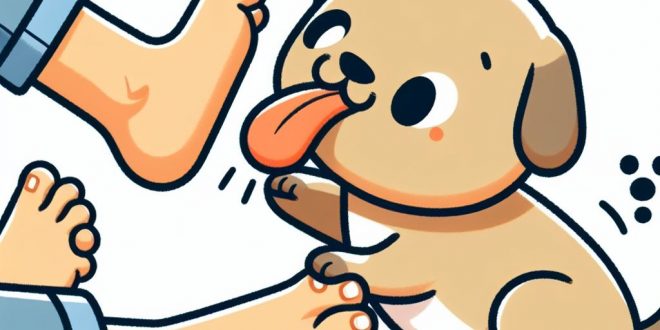Why Is My Dog Obsessed With My Feet – Have you ever found your dog fixated on your feet, licking or pawing at them incessantly? As odd and uncomfortable as it may feel, foot obsession is a common behavior among dogs. But what causes this peculiar behavior?
In this article, we’ll explore the reasons why dogs become fixated on human feet and how to address this issue. From understanding canine behavior and instincts to exploring theories on foot fixation, we’ll provide insights and tips to help you better understand your furry friend’s behavior.
So, if you’ve been struggling with your dog’s foot fetish, look no further. Let’s dive in and uncover the reasons behind this bizarre yet fascinating canine behavior.
Keywords: why is my dog obsessed with my feet, dog feet obsession
Table of Contents
Canine Behavior and Body Language
If you’re wondering why your dog is obsessed with your feet, understanding their behavior and body language is crucial. Dogs communicate through their body language, and their behavior often provides clues about what they’re thinking or feeling.
Dogs are highly social animals and use body language to convey their emotions, intentions, and needs to other dogs and humans. By observing your dog’s body language in different situations, you can gain valuable insights into how they’re feeling and why they might be fixated on your feet.
Dog Behavior
Dog behavior can be influenced by various factors, including genetics, environment, and training. Some common dog behaviors include barking, growling, wagging their tail, and jumping up.
Understanding why dogs exhibit certain behaviors requires observing them in different situations and context. For example, a dog’s tail wagging might indicate excitement, happiness, or even fear or anxiety, depending on the situation.
Canine Behavior
Dogs use a variety of body language cues to communicate their intentions and emotions. Some common canine behavior includes:
- Raised hackles: This behavior occurs when a dog’s hair stands up along their back and neck. It can indicate fear, aggression, or excitement.
- Ear position: When a dog’s ears are forward, it indicates they’re alert and interested in something. If their ears are back, it could indicate fear or submission.
- Eye contact: Dogs use eye contact to communicate with each other. A direct stare could indicate aggression, while avoiding eye contact could indicate fear or submission.
Dog Body Language
The following are some common dog body language cues to look out for:
| Behavior | Meaning |
|---|---|
| Tail wagging | Excitement, happiness, or fear/anxiety |
| Pawing | Seeking attention, affection, or food |
| Licking | Affection, grooming, or anxiety |
| Whining or growling | Signaling discomfort or danger |
By being mindful of your dog’s body language, you can better understand their communication and behavior, including their fixation on your feet.
The Instinctual Nature of Dogs
Dogs are fascinating creatures whose behaviors are often influenced by their instincts. As a canine owner, understanding your dog’s instincts is critical in deciphering not only their behavior but also their needs and wants. Just like their wild ancestors, dogs have a prey drive, social hierarchies, and a pack mentality that guides their actions.
Instincts play a significant role in a dog’s behavior and can explain why they may develop a fixation on your feet. Canine behavior and evolutionary biology experts suggest that dogs view their owners’ feet as extensions of themselves and may be inclined to investigate them as a way of better understanding their owner and their surroundings.
The Role of Canine Behavior in Foot Fixation
Canine behavior can provide valuable insights into why dogs develop a fixation on feet. Understanding how dogs communicate with their body language and vocalizations can help pet owners identify the potential motivations behind their dog’s behavior.
| Behavior | Possible Explanation |
|---|---|
| Pawing at Feet | Dogs use their paws to communicate and may be asking for attention or seeking affection. |
| Licking Feet | Dogs use their tongues to explore their environment and may be drawn to the saltiness of human skin. |
| Biting Feet | Dogs may view their owner’s feet as toys and may be playing or instinctually practicing hunting behaviors. |
It’s essential to understand that a dog’s behavior is often a combination of factors, including their natural instincts, past experiences, and current surroundings. A dog’s obsession with feet may be a result of a combination of these factors.
The Pack Mentality and Foot Fixation
Dogs are pack animals and have a strong desire to be part of a group. In the wild, a pack’s survival depended on their ability to hunt prey and defend against predators. As such, dogs have a keen sense of smell and are naturally curious about their environment.
Experts suggest that dogs view their owners as part of their pack and may be inclined to investigate their owner’s feet as a way of better understanding them. A dog’s natural curiosity can influence their behavior and may explain why they may develop a fixation on their owner’s feet.
Pawing Behavior and Foot Obsession
Dogs use their paws to communicate. Pawing behavior is common and can mean anything from seeking attention to expressing excitement or anxiety. However, when it comes to foot obsession, there may be some specific reasons why your dog is pawing at your feet.
| Reasons for Pawing | What it Could Mean for Foot Obsession |
|---|---|
| Attention seeking | Your dog may be seeking attention and interaction with you. By pawing at your feet, they are trying to get your attention and initiate play or other activities. |
| Excitement or Anxiety | In some cases, pawing can be an expression of excitement or anxiety. If your dog is highly stimulated or nervous, they may start pawing at your feet as a way to release some of their energy or calm themselves down. |
| Exploration and Curiosity | Some dogs are naturally curious and may use their paws to explore their environment. This could mean pawing at your feet to gather information about you or something nearby. |
Understanding the reasons behind your dog’s pawing behavior can help you address their foot obsession more effectively. By recognizing when your dog is pawing for attention, excitement, anxiety, or exploration, you can redirect their focus and help them develop healthier behaviors.
Why Is My Dog Obsessed With My Feet?
There are various theories that experts in dog psychology have put forth to explain why dogs might develop a fixation on feet. Here, we’ll explore some of the most common theories:
1. Seeking Attention
One theory suggests that dogs might develop a foot fixation as a way to seek attention from their owners. If a dog learns that pawing or licking their owner’s feet gets a response, they might continue doing it to receive attention and affection.
2. Natural Curiosity
Dogs are naturally curious creatures, and their interest in your feet might be a result of exploring and investigating their surroundings. They might be attracted to the smell, texture, or movement of your feet and simply want to investigate.
3. Anxious or Stressful Behavior
In some cases, a foot fixation might be a sign of anxiety or stress in dogs. If a dog is feeling anxious or stressed, they might exhibit compulsive behaviors such as licking or pawing at their owner’s feet as a way to cope.
4. Innate Instincts
Dogs have powerful instincts that have been developed over centuries of domestication and breeding. Some experts believe that a fixation on feet might be a result of a dog’s innate instincts to protect or guard their owner. By obsessively focusing on your feet, a dog might be trying to ensure your safety and wellbeing.
5. Lack of Socialization
Finally, a dog’s fixation on feet might be a result of inadequate socialization. Dogs that don’t receive proper socialization and training might struggle to develop appropriate behaviors and might resort to attention-seeking or compulsive behaviors as a way to cope.
While there is no one definitive answer to why dogs develop foot fixations, exploring these different theories can provide valuable insights into your dog’s behavior.
Licking Feet: Is it Normal?
Dogs are known for their grooming habits, including licking their paws. However, when it comes to licking their owner’s feet, it can be a cause for concern. While some foot licking is normal behavior, excessive licking can indicate an underlying issue.
Reasons for Dog Licking Feet
There can be several reasons why your dog is fixated on your feet:
- Sensory: Dogs have a strong sense of smell, and the sweat and scent from your feet might be appealing to them.
- Anxiety or stress: Dogs may lick their owner’s feet as a form of self-soothing when feeling anxious or stressed.
- Medical issues: Certain medical conditions, such as skin allergies or infections, can cause dogs to lick their paws and feet excessively.
When to Be Concerned
If your dog’s foot licking behavior becomes excessive, it can lead to several issues, including:
- Skin irritation or infection: Excessive licking can cause irritation or infection, leading to open sores or wounds.
- Behavioral issues: Foot licking can become a compulsive behavior, leading to other unwanted behaviors such as biting or chewing.
If your dog’s foot licking behavior becomes problematic, it’s important to consult with a veterinarian to rule out any underlying medical issues.
Sensory and Health Factors Behind Your Dog’s Foot Obsession
There can be various reasons behind your dog’s fixation on your feet, including sensory and health factors. Here are some potential explanations:
| Reasons | Why they may cause foot obsession |
|---|---|
| Skin allergies or irritations | Your dog may be trying to alleviate their discomfort by licking or pawing your feet. |
| Dirty or sweaty feet | Dogs have a keen sense of smell, and they may be attracted to the scent of sweat or other odors on your feet. |
| Joint or muscle pain | Dogs may sense pain or discomfort in your feet and try to alleviate it by licking or pawing the affected area. |
| Neurological conditions | In rare cases, abnormal neurological conditions such as compulsive disorder or seizures may cause dogs to fixate on certain objects or body parts, including feet. |
If any of these health or sensory factors seem to be the underlying cause of your dog’s foot fixation, it’s important to consult with a veterinarian to identify and treat the issue.
In addition to these factors, it’s possible that your dog’s pawing behavior is simply a learned behavior that has become a habit over time. In the following sections, we’ll explore how training and redirection techniques can help address this behavior.
Social and Emotional Connection
Dogs are highly social creatures and thrive on human interaction. Their fixation on feet can be a way to seek attention and affection from their owners, as they may view it as a playful and engaging behavior. Additionally, dogs often form strong emotional bonds with their owners and view them as a source of comfort and security.
It’s important to understand that a dog’s fixation on feet is not necessarily a sign of aggression or dominance, but rather a way for them to express their desire for attention and contact.
However, it’s crucial to establish boundaries and teach your dog appropriate behaviors to avoid discomfort or harm, especially if you have children or other pets in the household. By providing your dog with plenty of love, attention, and physical contact through appropriate petting and playtime, you can strengthen your bond and help reduce their fixation on your feet.
Training Techniques for Foot Fixation
Dealing with your dog’s foot fixation may take some time and patience, but there are several training techniques that you can apply to manage this behavior. Below are some training tips that can help redirect your dog’s attention and discourage their fixation on your feet.
Teach basic commands
Teaching your dog basic commands such as “sit,” “stay,” and “leave it” can help redirect their attention when they start obsessing over your feet. Positive reinforcement training methods can be an effective way to teach your dog these commands.
Keep your dog engaged
Providing your dog with mental and physical stimulation can help reduce their fixation on your feet. Interactive toys, puzzle feeders, and long walks can help keep your dog engaged and less focused on your feet.
Redirect their attention
If you notice your dog fixating on your feet, redirect their attention to a more appropriate behavior. For example, offer them a toy or ask them to perform a simple command such as “sit.” By doing so, you can help break their fixation on your feet.
Practice gradual desensitization
Gradual desensitization involves exposing your dog to their trigger (in this case, your feet) in small doses and gradually increasing the exposure over time. By doing so, your dog can become desensitized to your feet and their fixation may lessen.
Consult with a professional
If your dog’s fixation on your feet persists or becomes problematic, it may be necessary to consult with a professional dog trainer or behaviorist. They can provide additional guidance and training techniques tailored to your dog’s specific needs.
Redirecting Your Dog’s Attention
If your dog’s fixation on your feet is causing problems or discomfort, there are ways to redirect their attention to more appropriate behaviors.
Toys and Treats
Provide your dog with toys and treats that can keep them occupied and mentally stimulated. Puzzle toys and chew toys are great options that can help redirect their focus away from your feet.
Positive Reinforcement
Using positive reinforcement techniques can also help train your dog to engage in different behaviors. Rewarding your dog with treats or praise when they display appropriate behavior can reinforce positive habits and reduce their fixation on your feet.
Exercise and Playtime
Ensuring your dog gets enough exercise and playtime can also reduce their fixation on your feet. Regular exercise can help release pent-up energy and reduce anxiety that may contribute to their fixation.
Training Techniques
Implementing training techniques such as “leave it” or “drop it” can help redirect your dog’s attention away from your feet when necessary. These techniques can be taught through positive reinforcement and repetition.
Professional Help
If your dog’s fixation on your feet persists or becomes problematic, it may be necessary to seek the help of a professional dog trainer or behaviorist. They can provide tailored solutions and guidance specific to your dog’s needs.
Seeking Professional Help
If your dog’s foot fixation persists or becomes problematic, it may be necessary to seek professional help. While some behavior modifications can be implemented at home, consulting a veterinarian or a professional dog trainer can provide further guidance and support.
Canine behavior is complex, and addressing the root cause of your dog’s behavior requires an understanding of dog psychology, as well as the training techniques that are most effective. A veterinarian can help rule out any underlying health concerns that may be contributing to your dog’s fixation on your feet.
A professional dog trainer can offer insights into your dog’s behavior and provide effective training strategies to redirect their focus. They can also help you create a structured training program that properly addresses the behavior while also promoting a healthy relationship between you and your dog.
It’s important to ensure that the professional you work with has the necessary qualifications and experience in addressing canine behavior. Do your research to find a trustworthy and reputable veterinarian or dog trainer.
Conclusion of Why Is My Dog Obsessed With My Feet
If you’ve been wondering why your dog is fixated on your feet, understanding the reasons behind this behavior can help you manage and address it. It’s important to consider factors such as instincts, health, training, and redirection techniques to help your dog develop healthier behaviors and strengthen your bond.
The Dog Foot Fetish Why Is My Dog Obsessed With My Feet
While the term “dog foot fetish” may sound amusing, it’s essential to address this behavior seriously. Excessive licking, pawing, or biting can not only cause discomfort but also signal underlying health or emotional issues.
By familiarizing yourself with your dog’s body language and behavior, you can identify when their fixation on your feet is becoming problematic and take proactive steps to address it. This can include redirecting their attention to other toys or activities, providing proper training to discourage undesirable behaviors, or seeking professional help.
Managing your dog’s foot fixation also means taking care of their physical and emotional needs. Ensuring they have a healthy diet, enough exercise, and opportunities for socialization and mental stimulation can help reduce their stress levels and improve their overall well-being.
Remember, your dog’s fixation on your feet may have various underlying reasons, and understanding them can help you provide the necessary support and care. With patience, consistency, and positive reinforcement, you can help your furry friend develop healthier habits and deepen your bond.
 Treat For Dog – Brain Training for Dogs, Dog Training & Obedience Discover Treat For Dog and get your pup on the path to smarter, happier, and healthier living with brain training for dogs.
Treat For Dog – Brain Training for Dogs, Dog Training & Obedience Discover Treat For Dog and get your pup on the path to smarter, happier, and healthier living with brain training for dogs.




